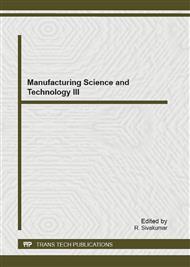[1]
Ajzen, I., The Theory of Planned Behaviour. Organization Behaviour and Human Decision Processes, Vol. 50 (1991), pp.179-211.
Google Scholar
[2]
Ajzen, I., Attitudes, Personality and Behaviour (2nd edition). Milton. Keynes, England: Open University Press, McGraw-Hill (2005).
Google Scholar
[3]
Ajzen, I. and Fishbein, M., Understanding Attitudes and Predicting Social Behaviour. Englewood-Cliffs, NJ: Prentice Hall (1980).
Google Scholar
[4]
Armitage C. J. and Conner M., The theory of planned behaviour: Assessment of predictive validity and perceived control,. British Journal of Social Psychology, Vol. 38 (1999), pp.35-54.
DOI: 10.1348/014466699164022
Google Scholar
[5]
Boldero, J., The prediction of household recycling of newspapers: the role of attitudes, intentions and situational factors. Journal of Applied Social Psychology, Vo. 25 (1995), pp.440-462.
DOI: 10.1111/j.1559-1816.1995.tb01598.x
Google Scholar
[6]
Bruvoll, A., Halvorsen, B. and Nyborg, K., Households' recycling efforts. Resources, Conservation and recycling, Vol. 36 (2002), pp.337-354.
DOI: 10.1016/s0921-3449(02)00055-1
Google Scholar
[7]
Carrus, G., Bonnes, M., Passafaro, P., Tronu, G. and Fornara, F., Planned behaviour and local, norms: an analysis of the space-based aspects of normative ecological behaviour. 4thInterational conference on spatial Cognition, Rome, Vol. 10(2009).
DOI: 10.1007/s10339-009-0292-9
Google Scholar
[8]
Chan K. Mass communication and pro-environmental behaviour: waste recycling in Hong Kong. Journal of Environmental Management, Vol. 52 (1998), pp.317-325.
DOI: 10.1006/jema.1998.0189
Google Scholar
[9]
Cheung S. F., Chan D. K. -S. and Wong Zoe S. -Y., Reexamining the theory of planned behaviour in understanding wastepaper recycling. Environment and Behaviour, Vol. 31 (1999), pp.587-612.
DOI: 10.1177/00139169921972254
Google Scholar
[10]
Chu Pin-Yu and Chiu Ja-Fun., Factors Influencing Household Waste Recycling Behvaiour: Test of an Integrated Model. Journal of Applied Social psychology, Vol. 33 (2003), pp.604-626.
DOI: 10.1111/j.1559-1816.2003.tb01915.x
Google Scholar
[11]
Davies, J., Foxall, G. R. and Pallister, J., Beyond the intention – behaviour mythology: an integrated model of recycling. Marketing Theory, Vol. 2 (2002), pp.29-113.
DOI: 10.1177/1470593102002001645
Google Scholar
[12]
Davis, G., Phillips, P. S., Read, A. D., Iida,Y., Demonstrating the need for the development of internal research capacity: Understanding recycling participation using Theory of Planned Behaviour in West Oxfordshire, UK. Resources, Conservation & Recycling, Vol. 46 (2006).
DOI: 10.1016/j.resconrec.2005.07.001
Google Scholar
[13]
Davis, G. and Morgan, S., Using the Theory of Planned Behaviour to determine recycling and waste minimization behaviours: A case study of Bristol City, UK. The American Community Psychologist, Vol. 20 (2008), pp.105-116.
Google Scholar
[14]
Hage, O., Soderholm, P. and Berglund, C., Norms and economic motivation in household recycling: Empirical evidence from Sweden. Resources, Conservation & Recycling, Vol. 53 (2009), pp.155-165.
DOI: 10.1016/j.resconrec.2008.11.003
Google Scholar
[15]
Hasnain M. I., AsaariFaridah A. H., RamliN. A., Shamshad Ahmad and Tan S. S., Solid waste collection and recycling in NibongTebal, Penang, Malaysia: a case study. Waste Management Research, Vol. 23 (2005), pp.565-570.
DOI: 10.1177/0734242x05059803
Google Scholar
[16]
Knussen, C. and Yule, F., I am not in the habit of recycling,: The role of habitual behaviour in the disposal of household waste. Environmental and Behaviour, Vol. 40 (2008), pp.683-702.
DOI: 10.1177/0013916507307527
Google Scholar
[17]
Knussen, C., Yule, F., MacKenzie, J. and Wells, M., An analysis of intentions to recycle household waste: The roles of past behaviour, perceived habit, and perceived lack of facilities. Journal of Environmental Psychology, Vol. 24 (2004).
DOI: 10.1016/j.jenvp.2003.12.001
Google Scholar
[18]
Kok, G. and Siero, S., Tin Recycling: Awareness, Comprehension, Attitude, Intention and Behaviour. Journal of economic Psychology, Vol. 6 (1985), pp.157-173.
DOI: 10.1016/0167-4870(85)90019-4
Google Scholar
[19]
Mannetti, L., Pierro, A. and Livi, S., Recycling: Planned and self-expressive behaviour. Journal of environmental Psychology, Vol. 24 (2004), pp.227-236.
DOI: 10.1016/j.jenvp.2004.01.002
Google Scholar
[20]
Ninth Malaysia Plan. Promoting environmental Stewardship, Kuala Lumpur: The Economic Unit Planning, Chapter 22, pp.453-463 (2006).
Google Scholar
[21]
Omran, A. &Gebril, A. O., Study of household attitude toward recycling of solid wastes: A case study. ACTA TECHNICA CORVINIENSIS – Bulletin of Engineering, Tome IV, (2011), pp.79-82.
Google Scholar
[22]
Omran, A., Mahmood, A., Abdula Aziz, H. &Robbison, G. M., Investigating households attitude toward recycling of solid waste in Malaysia: A case study. International Journal of Environmental Research, Vol. 3(2009), pp.275-288.
Google Scholar
[23]
Taylor, S. &Todd, P., An integrated Model of Waste Management Behaviour: A Test of Household Recycling and Composting Intentions. Environment and Behaviour, Vol. 27 (1995), pp.603-630.
DOI: 10.1177/0013916595275001
Google Scholar
[24]
Tonglet, M., Phillips, P. S., and Read, A. D., Using the Theory of Planned Behaviour to investigate the determinants of recycling behaviour: a case study from Brixworth, UK. Resources, Conservation & Recycling, Vol. 41(2004), pp.191-214.
DOI: 10.1016/j.resconrec.2003.11.001
Google Scholar
[25]
Vicente, P. &Reis, E., Factors influencing households' participation in recycling. Waste Management & Research, Vol. 26 (2008), pp.140-146.
DOI: 10.1177/0734242x07077371
Google Scholar
[26]
Vining, J. &Ebreo, A., Predicting Recycling behaviour from global and specific environmental attitudes and changes in recycling opportunities. Journal of Applied Social Psychology, Vol. 22 (1992), pp.1580-1607.
DOI: 10.1111/j.1559-1816.1992.tb01758.x
Google Scholar


